名词性从句和状语从句
状语从句与名词性从句的区别
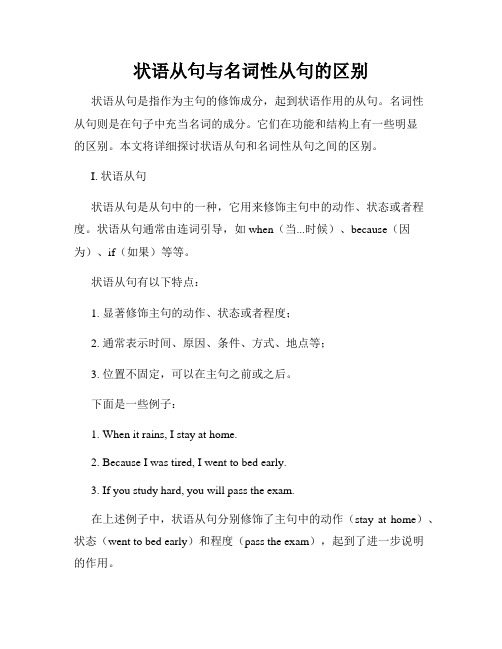
状语从句与名词性从句的区别状语从句是指作为主句的修饰成分,起到状语作用的从句。
名词性从句则是在句子中充当名词的成分。
它们在功能和结构上有一些明显的区别。
本文将详细探讨状语从句和名词性从句之间的区别。
I. 状语从句状语从句是从句中的一种,它用来修饰主句中的动作、状态或者程度。
状语从句通常由连词引导,如when(当...时候)、because(因为)、if(如果)等等。
状语从句有以下特点:1. 显著修饰主句的动作、状态或者程度;2. 通常表示时间、原因、条件、方式、地点等;3. 位置不固定,可以在主句之前或之后。
下面是一些例子:1. When it rains, I stay at home.2. Because I was tired, I went to bed early.3. If you study hard, you will pass the exam.在上述例子中,状语从句分别修饰了主句中的动作(stay at home)、状态(went to bed early)和程度(pass the exam),起到了进一步说明的作用。
II. 名词性从句名词性从句是从句中的一种,它在句子中充当名词的成分,可以作为主语、宾语、表语或者同位语。
名词性从句通常由连词或连词词组引导,如that(那)、whether(是否)、what(什么)、who(谁)等等。
名词性从句有以下特点:1. 充当句子的一个成分,通常是主语、宾语或表语;2. 位置相对固定,通常位于主句之后;3. 通常引导引导词后面有个逗号。
下面是一些例子:1. What he said is true.2. Whether she will come to the party is uncertain.3. I don't know who wrote this book.在上述例子中,名词性从句分别充当了主语(What he said)、宾语(Whether she will come to the party)和表语(who wrote this book),起到了名词的作用。
高中英语知识点归纳名词性从句与状语从句的区别

高中英语知识点归纳名词性从句与状语从句的区别名词性从句与状语从句是英语中常见的从句类型,它们在语法结构和句子功能等方面存在一定的区别。
本文将对这两种从句进行归纳总结,以帮助高中学生更好地理解和运用它们。
一、名词性从句名词性从句在句子中充当名词的功能,可以作主语、宾语、表语或介词宾语。
根据从句与主句之间的关系,名词性从句可分为主语从句、宾语从句、表语从句和同位语从句。
1. 主语从句主语从句在句子中作主语,常由连接词that引导,也可以用连接词whether/if引导。
例如:- That he is late again is really annoying.(他再次迟到真令人恼火。
)- Whether he will come to the party is still uncertain.(他是否会来参加聚会还不确定。
)2. 宾语从句宾语从句在句子中作及物动词的宾语,常由连接词that引导,也可以用连接词whether/if引导。
例如:- She said that she would help me with my homework.(她说她会帮我做作业。
)- I wonder whether/if he has received my message.(我想知道他是否收到了我的消息。
)3. 表语从句表语从句在句子中作表语,常由连接词that引导,也可以用连接词whether/if引导。
例如:- His dream is that he can travel around the world.(他的梦想是能够环游世界。
)- The question is whether/if she can pass the exam.(问题是她能否通过考试。
)4. 同位语从句同位语从句与名词并列,对名词进行解释、补充或说明。
它一般由连接词that引导。
例如:- The fact that he lied surprised everyone.(他撒谎的事实让每个人都感到惊讶。
状语从句与名词性从句的区别与联系
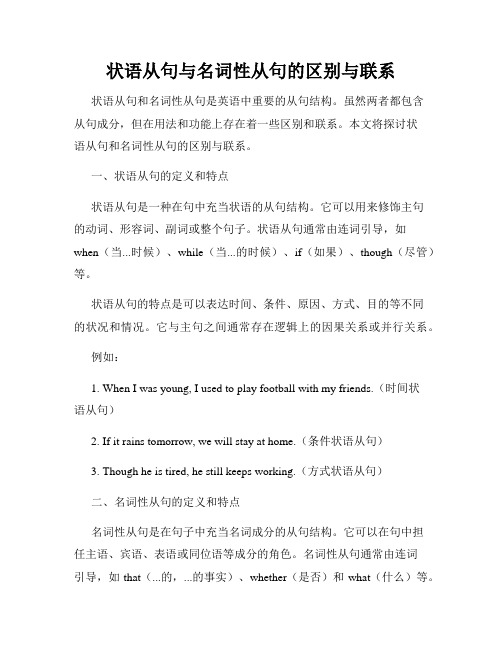
状语从句与名词性从句的区别与联系状语从句和名词性从句是英语中重要的从句结构。
虽然两者都包含从句成分,但在用法和功能上存在着一些区别和联系。
本文将探讨状语从句和名词性从句的区别与联系。
一、状语从句的定义和特点状语从句是一种在句中充当状语的从句结构。
它可以用来修饰主句的动词、形容词、副词或整个句子。
状语从句通常由连词引导,如when(当...时候)、while(当...的时候)、if(如果)、though(尽管)等。
状语从句的特点是可以表达时间、条件、原因、方式、目的等不同的状况和情况。
它与主句之间通常存在逻辑上的因果关系或并行关系。
例如:1. When I was young, I used to play football with my friends.(时间状语从句)2. If it rains tomorrow, we will stay at home.(条件状语从句)3. Though he is tired, he still keeps working.(方式状语从句)二、名词性从句的定义和特点名词性从句是在句子中充当名词成分的从句结构。
它可以在句中担任主语、宾语、表语或同位语等成分的角色。
名词性从句通常由连词引导,如that(...的,...的事实)、whether(是否)和what(什么)等。
名词性从句的特点是具有名词的功能,可以在句子中起到名词所起的作用。
它可以作为主语来引导句子的内容,也可以作为宾语接受动词的作用,还可以作为表语或同位语说明某一事物的性质或身份。
例如:1. What you said is true.(主语从句)2. I don't know whether he will come or not.(宾语从句)3. Her wish is that she can study abroad.(表语从句)三、状语从句与名词性从句的区别1. 位置不同:状语从句通常位于主句之前或之后,作为主句的修饰语;而名词性从句作为一个整体在句子中充当名词成分。
英语语法--名词从句和状语从句
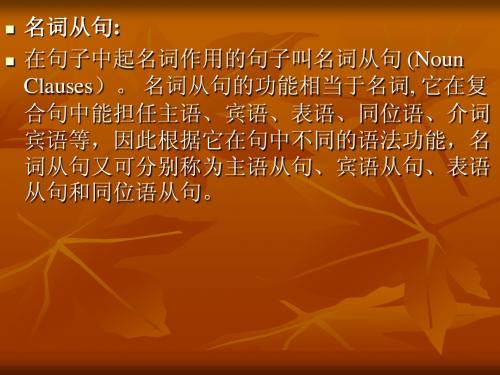
6. _____ that there is another good harvest this year. A. It says B. It is said C. It was said D. He was said 7. Take _____ much you want and _____ you want to. A. however/when B. whenever/how C. however/whoever D. however/whenever 8. It is strange _____. A. that no one should like this book B. that no one liked this book C. that why no one likes this book D. why no one likes this book 9. It is suggested that the experiment _____ under low temperature. A. makes B. is make C. should be made D. will be made 10. _____ still needs to be discussed. A. How is the plan to be carried out B. How the plan is to be carried out C. Why is the plan carried out D. Why the plan carried out
if, whether引导的名词从句 主语:Whether the plan is feasible remains to be proved. 宾语:Let us know whether / if you can finish the article before Friday. 表语:The point is whether we should lend him the money. 同位语:They are investigating the question whether the man is trustworthy. 形容词宾语: She‘s doubtful whether we shall be able to come. 介词宾语: I worry about whether he can pass through the crisis of his illness. 我担心他是否 能度过疾病的危险期。
语法解析名词性从句与状语从句的相似之处
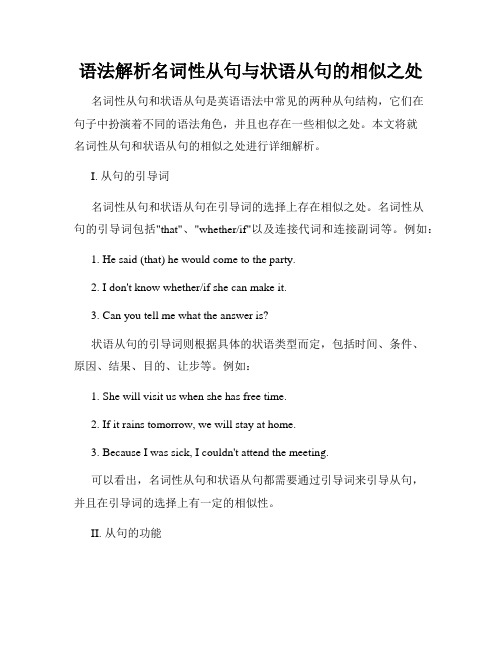
语法解析名词性从句与状语从句的相似之处名词性从句和状语从句是英语语法中常见的两种从句结构,它们在句子中扮演着不同的语法角色,并且也存在一些相似之处。
本文将就名词性从句和状语从句的相似之处进行详细解析。
I. 从句的引导词名词性从句和状语从句在引导词的选择上存在相似之处。
名词性从句的引导词包括"that"、"whether/if"以及连接代词和连接副词等。
例如:1. He said (that) he would come to the party.2. I don't know whether/if she can make it.3. Can you tell me what the answer is?状语从句的引导词则根据具体的状语类型而定,包括时间、条件、原因、结果、目的、让步等。
例如:1. She will visit us when she has free time.2. If it rains tomorrow, we will stay at home.3. Because I was sick, I couldn't attend the meeting.可以看出,名词性从句和状语从句都需要通过引导词来引导从句,并且在引导词的选择上有一定的相似性。
II. 从句的功能名词性从句在句子中担任名词的功能,可以充当主语、宾语、表语以及介词的宾语等。
例如:1. What she said is true.(名词性从句作主语)2. I don't know where he lives.(名词性从句作宾语)3. His wish is that he can travel around the world.(名词性从句作表语)4. We are looking forward to the day when we can meet again.(名词性从句作介词的宾语)状语从句则用来对整个句子或者谓语动词进行修饰,从而在句子中担任副词的功能。
名词性从句与状语关系分析

名词性从句与状语关系分析在英语语法中,名词性从句和状语从句是两种重要的句子结构。
名词性从句在句子中起到名词的作用,可以充当主语、宾语、表语或同位语;而状语从句则起到状语的作用,修饰其他成分。
本文将分析名词性从句和状语从句之间的关系。
一、名词性从句的定义与作用名词性从句是一种从句,可以在句子中起到名词的作用。
它所包含的从句成分根据从句的功能而定,可以充当主语、宾语、表语或同位语。
作为主语:What you said is true.(你说的是真的。
)作为宾语:I know that he is a doctor.(我知道他是个医生。
)作为表语:The problem is whether we can finish it on time.(问题在于我们是否能够按时完成。
)作为同位语:Her belief that everything happens for a reason gives her strength.(她坚信一切都有原因,这给了她力量。
)二、状语从句的定义与作用状语从句是一种从句,在句子中作为状语,对其他成分进行修饰。
状语从句可以表示时间、地点、原因、条件、方式等多种关系。
时间状语从句:When he arrived, we had already left.(当他到达时,我们已经离开了。
)地点状语从句:Wherever you go, I will follow.(无论你去哪里,我都会跟随。
)原因状语从句:Because it was raining, we stayed indoors.(因为下雨了,我们待在室内。
)条件状语从句:If you study hard, you will pass the exam.(如果你努力学习,你会通过考试。
)方式状语从句:She sings as if she were a professional singer.(她唱歌的样子好像是一名专业歌手。
状语从句和名词性从句
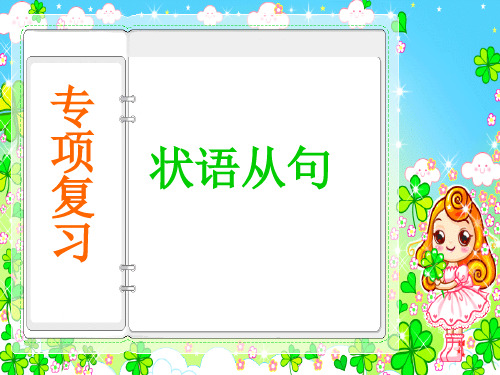
3)as倒装--“虽然/尽管”
e.g. Late as it was, they kept on working. Child as he is, he knows a lot. Much as I admire his father, I don’t
like John. Try as you may, you might fail as
called. 2.一些含有time的名词短语,如every time, each time,
next time, by the time等,以及the day, the year, the morning等,也可引导一个时间状语从句。
The day he returned home, his father was already
1、各种从属连词的含义及用法
比较;
考
2、no matter wh- 与 wh-ever 引 导的从句的区别;
点 3、状语从句的时态问题;
难 4、状语从句倒装及紧缩问题; 点 5、状语从句与其它从句的区别。
1. 时间状语从句
1. (04北京春) We were swimming in the lake ___A___ suddenly the
专
项 复
Hale Waihona Puke 状语从句习状语从句有九种, 时地原因条状补, 目比结果方让步, 连词引导各不同; 主句通常前面走, 连词引导紧随后, 从句若在主前头, 主从之间有个逗。
时间状语从句 原因状语从句 地点状语从句 目的状语从句 结果状语从句 条件状语从句 让步状语从句 比较状语从句 方式状语从句
状语从句的分类
A. He hardly had
B. Had he hardly
状语从句和名词性从句的区别与联系
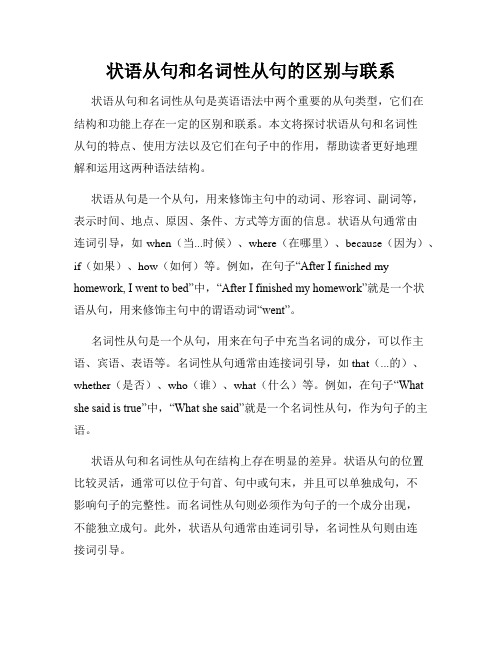
状语从句和名词性从句的区别与联系状语从句和名词性从句是英语语法中两个重要的从句类型,它们在结构和功能上存在一定的区别和联系。
本文将探讨状语从句和名词性从句的特点、使用方法以及它们在句子中的作用,帮助读者更好地理解和运用这两种语法结构。
状语从句是一个从句,用来修饰主句中的动词、形容词、副词等,表示时间、地点、原因、条件、方式等方面的信息。
状语从句通常由连词引导,如when(当...时候)、where(在哪里)、because(因为)、if(如果)、how(如何)等。
例如,在句子“After I finished my homework, I went to bed”中,“After I finished my homework”就是一个状语从句,用来修饰主句中的谓语动词“went”。
名词性从句是一个从句,用来在句子中充当名词的成分,可以作主语、宾语、表语等。
名词性从句通常由连接词引导,如that(...的)、whether(是否)、who(谁)、what(什么)等。
例如,在句子“What she said is true”中,“What she said”就是一个名词性从句,作为句子的主语。
状语从句和名词性从句在结构上存在明显的差异。
状语从句的位置比较灵活,通常可以位于句首、句中或句末,并且可以单独成句,不影响句子的完整性。
而名词性从句则必须作为句子的一个成分出现,不能独立成句。
此外,状语从句通常由连词引导,名词性从句则由连接词引导。
另外,状语从句和名词性从句在句子中的作用也存在区别。
状语从句用来修饰或限制主句中的动作或状态,起到补充说明的作用。
它可以表示时间、地点、原因、条件等等。
而名词性从句则充当名词的角色,可以出现在主语、宾语、表语等位置,承担主要的句子成分。
虽然有着明显的差异,状语从句和名词性从句在语法功能上也存在联系。
首先,它们都是从句结构,都可以在句子中起到进一步说明或充实句子意义的作用。
- 1、下载文档前请自行甄别文档内容的完整性,平台不提供额外的编辑、内容补充、找答案等附加服务。
- 2、"仅部分预览"的文档,不可在线预览部分如存在完整性等问题,可反馈申请退款(可完整预览的文档不适用该条件!)。
- 3、如文档侵犯您的权益,请联系客服反馈,我们会尽快为您处理(人工客服工作时间:9:00-18:30)。
名词性从句和状语从句名词性从句在简单句中,各种句子成分是由单词、词组、介词短语、非限定动词短语等构成的,如果一个句子由一个主句和一个(含一个以上)的从句构成,则成为复合句。
在复合句中,从属句的种类取决于其在整个句子中所起的作用。
根据这一点,从句可分为主语从句、宾语从句、表语从句、同位语从句、定语从句和状语从句。
由于主语从句、宾语从句、表语从句和同位语从句相当于名词在句子中通常所起的作用,故被统称为名词性从句。
由wh-疑问词引出的名词性从句不可用疑问句语序。
名词性从句常用下列关联词引导:从属联词:that, whether , if连接代词:who, whom, whose, which, what,. whose, whichever, whatever连接副词:when, where, how, why注: 在what引导的名词性从句中, 一般情况下what = all thatThat was what/all that he had when he died.I won’t tell you what/all that the president said at the meeting.一、主语从句主语从句在句子中起主语作用,一般位于主句谓语之前:What you need now is experience.When the meeting will be held remains a question.Whether solar energy can be used on a large scale is a thing we have great interest in.注: 从句做主语时,为了使句子更加平衡,通常用it作形式主语,而将真正的主语从句放在句末。
It is well known that the sea covers about three-fourths of the earth’s surface.Is it certain that he will win the game?It wasn’t without difficulty that he accomplished his goal.if引导的主语从句不能位于句首。
Whether it costs too much relies on how badly you need it.Whether she comes is still not known.二、宾语从句宾语从句就是用从句形式作宾语,一般位于主句中的及物动词、介词及某些形容词之后,有时用it作形式宾语,从句位置后移,连词that有时可省略。
They told me (that) math is very difficult.He is confident (that) he will take his university degree in the coming year.She asked if I could tell her why Paul left the university without a diploma.We found it reasonable that we stop to have a rest.I consider it necessary that they make the experiment one more time.在think, believe suppose, expect等动词后的宾语从句若为否定意义时,可将其转换为对主句的否定,而在从句部分用肯定式,构成否定转移。
The doctor doesn’t think (that) the patient is capable of traveling in health condition.= The doctor thinks (that) the patient isn’t capable of traveling in health conditionI don’t believe (that) you are right on this point.=I believe (that) you are not right on this point.If引导的宾语从句不能位于介词之后。
也不能和or not连用。
It all depends on whether we can get their cooperation.I wonder whether they need help or not.三. 表语从句表语从句就是用句子形式作的表语,位于系动词之后,连词that可省略;My problem is how we can reduce the cost in production.The attraction between the sun and the earth is what keeps pulling the earth into a curved path.The problem is (that) we don’t have enough accommodation for all the students.用as if (a though)作连词时,可用虚拟语气,也可用陈述语气.It looks as if he has promised to come.I feel as if it were the end of the world. (虚拟)If不能引导表语从句。
The question is whether they has got in contact with the headquarter.四、同位语从句同位语从句是用句子形式表示的同位语,用于说明前面名词的内容,使之更加明确。
同位语从句前的名词通常是一些需要进一步说明其内容的词,如:conclusion, fact, hope, idea, opinion, suggestion, news,reason, thought, belief, truth等。
主要由that引导, 也可用what, where, how, when, why,whether等. 引导同位语从句的that 是连接词, 无词义, 属虚词,不能充当句子成分。
If 不能引导同位语从句。
如:I still have some hope that I will succeed.I have no idea what time it is now.The fact that he has spoken to the press about this caused us a lot of embarrassment.Whether they will join us hasn’t been made clear.状语从句状语从句就是用句子形式表示的状语,用来说明主句中的谓语、状语、定语或整个句子。
故而又称为副词性从句。
带状语从句的复合句中,主句结构比较完整,没有它主句意思依旧成立。
而在带有名词性从句的复合句中,该名词性从句是全句不可或缺的部分,否则句子意思就不完整。
名词性从句在整个句子中的位置是较为固定的,一般不可更变。
而状语从句可置于主句之前,也可置于主句之后,前置时常常用逗号点开,后置时一般不用逗号。
状语从句分为时间状语从句、地点状语从句、让步状语从句、原因状语从句、结果状语从句、目的状语从句、条件状语从句、方式状语从句、比较状语从句等九种。
每种状语从句各自有一定的连接词语。
1. 时间状语从句时间状语从句通常由下列连词引导:When, while, whenever, since, after, as, once, until, as soon as, before, so(as)long as, till, the moment等, 例如:Once you see her, you will never forget her.While Betty was getting dressed, she kept looking at the clock.When it rains, I usually go to work by bus.注:用since (自……以来)引导时间状语从句时, 主句要用完成时态, since 从句则常用一般过去时态或现在完成时态, 若要说明某事发生以来至今的时间长度, 要用It is (It’s been) + 时间词语+since的句型结构,如:I have come here several times since you left us.It’s three since my daughter caught the flu.注:连词when, while及as 都可表示“当……时”, 但用法有区别: 用When时, 从句和主句的动作可以同时发生,也可以先后发生; 用as , while 时则强调从句和主句的动作同时发生,从句的谓语用进行时态,表示“随着”, “正当”, “一边……一边”的意义,while 所引导的从句,谓语通常用延续性动词的一般时或进行时。
例如:She dropped the letter when she sat down.While my parents were watching TV, I was preparing for my lessons of the next day.As the national economy is developing, our life has greatly improved.2. 地点状语从句地点状语从句用以下连接词引导:where, whereverWhen previewing a new lesson, make marks where you have questions.Where there is a will, there is a way.Wherever I am, I will be thinking of you.3. 原因状语从句引导原因状语从句通常由以下连词引导:Because, since, as, now that, in that, for the reason that, seeing that等.其中because “原因”语气最强, 表示有必然的因果关系,所引导的从句是整个句子的重心所在, 位置一般在主句后, 需要强调时, 也可前置。
Since表示一种间接或附带的原因,可译为“既然”,as的语气更弱。
We didn’t go to that restaurant because the service there was quite poor.Since we have got so much disagreement, the plan was not practical.As they live in the countryside, they can enjoy the fresh air.Seeing that you are inexperienced, you are not for the job.now that=since, in that=becauseNow that the train has left, we can wait till tomorrow.This plant is unique in that it can live without water.注:当……because 置于句首时,后面的主句切不可象汉语那样再加上一个so (所以), 在汉语中习惯说”因为……所以”, 但英语的because 是不能与so相呼应的.4. 条件状语从句引导条件状语从句的连词有:if, unless, in case, so (as )far as, provided (that)on condition that, suppose, supposing (that), as (so) long as等。
